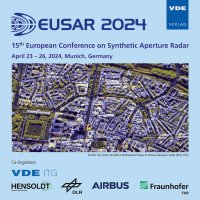Assessing the Reliability of InSAR Ground Displacement Products: The Role of Time Inconsistencies in Sequences of Multi-look Interferograms
Conference: EUSAR 2024 - 15th European Conference on Synthetic Aperture Radar
04/23/2024 - 04/26/2024 at Munich, Germany
Proceedings: EUSAR 2024
Pages: 6Language: englishTyp: PDF
Authors:
Falabella, Francesco; Pepe, Antonio
Abstract:
Assessing the reliability of ground displacement products estimated using Multi-temporal lnSAR (Mt-lnSAR) algorithms is not trivial when only measured interferometric data are available; typically, external independent measurements are lacking and, if any, only for sparse points in space. Thus, data-driven methodologies working on complex InSAR data are usually adopted to characterize the precisions oflnSAR estimates by computing the interferometric covariance matrix. Likewise, rime inconsistencies arising in sequences of multi-look (ML) SAR interferograms, which have undergone at least one independent processing step (such as multi-look, filtering, phase-unwrapping), introduce other spurious signals that further affect the estimate reliability. Among these contributions, some can be treated stochastically and others deterministically. In this work, we address a statistical covariance-based approach to quantify the uncertainties introduced by decorrelation noise and phase-unwrapping errors. Instead, the deterministic terms resulting from time inconsistencies are compensated for using a recently developed phase bias compensation method. Some experimental results have been conducted by applying the methodologies to Sentinel-1 SAR datasets over an area between the Basilicata and Campania regions in southern Italy and on the Gummem marble mining site in Austria. Eventually, we analyze the effectiveness of the methods by inspecting the achieved results and pointing out some limitations that should be overcome in the future.


